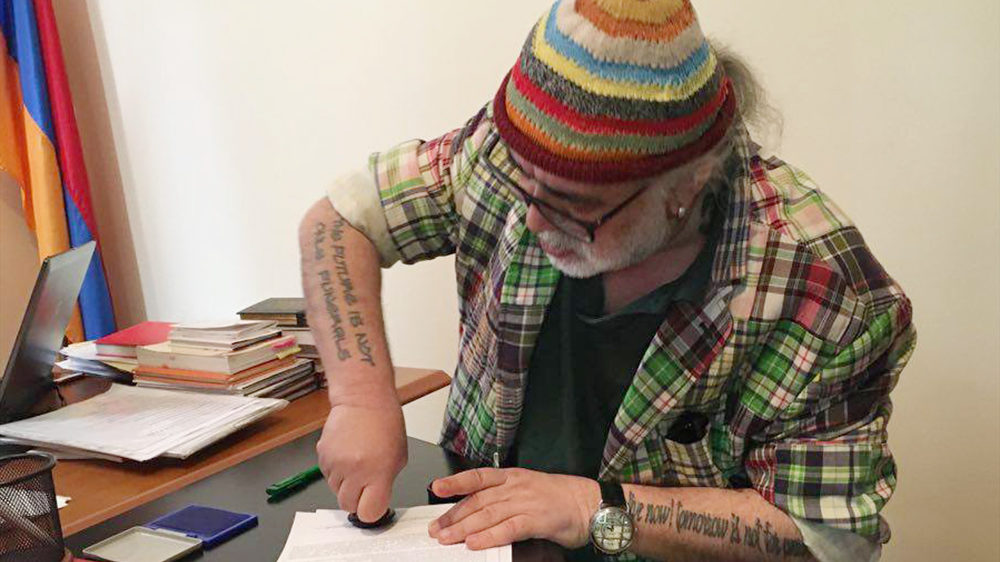“Over the years we have seen a great collaboration of efforts among the member organisations to make the creation of Human Rights House Yerevan possible. We share the excitement of our colleagues, who were committed and involved throughout the entire process. The result of the hard work is that human rights organisations will now have an independent meeting place at a time when the right to freedom of assembly cannot be taken for granted,” said Ane Tusvik Bonde, HRHF’s Regional Manager for Eastern Europe and Caucasus.
The House will provide the existing community of non-governmental organisations (NGOs) with further opportunities for collaboration, community-building, and cost-sharing. It will also provide a more secure location for NGOs to thrive in the currently difficult climate in Armenia. In 2015, Armenian NGO PINK was threatened and intimidated for its work on LGBT issues by sections of the public and some political figures in Armenia, and election monitors from civil society, including some from the core group, faced intimidation for their work during a referendum in December 2015.
“We will increase collaboration by sharing the space, and will show solidarity when someone is threatened. It will be more difficult to attack several organisations than one who is located separately,” said Lara Aharonian, Director of Women’s Resource Center, a non-governmental organisation (NGO) in the core group establishing Human Rights House Yerevan.
“We want to create a safe, inclusive space for civil society. To reflect this goal, the House must be open and accessible. It should also strengthen the civil society. To achieve this, we will make the conference room available for other organisations and everyone will be able to use the library. And we will have a space where activists can work and organise themselves,” continued Aharonian.
An ongoing process
HRHF and the core group found the property in spring 2014, and by April 2016 had concluded all of the processes and resolved any problems, paving the way for the purchase. Even though the building is now purchased, there is still work to be done to turn it into an open and accessible hub for human rights. However, this will not stop the organisations from holding events this summer.
“The House should be built on teamwork. This is why we have decided that each organisation will organise an event each Friday evening in the garden to make the public aware of the location and activities of the organisations in the new Human Rights House. The events will be promoted on social media. Every fourth week, we will have a cultural event, where we will ask the public to donate a symbolic sum for the entrance. This will be used for the running of the House,” said Lara Aharonian.
This autumn, fundraising for necessary renovations will continue.
A decade of civil society collaboration
The process to create a human rights house in Yerevan was launched back in 2005, and for the duration, the project has faced challenges. HRHF and the core group have overcome these challenges, and through this they have strengthened their solidarity and collaboration.
Since the beginning, a core group of human rights organisations have worked together with the Human Rights House Foundation. As part of their involvement with the Human Rights House Network, the group have been involved in several collaborative processes, including: the establishment of the South Caucasus Network in 2009, joint cross-border projects with other human rights houses, promoting the participation of LGBT and women’s rights defenders, and increasing the focus on women’s rights defenders by hosting a meeting with activists from Chechnya, Croatia, Georgia and Russia. The group have also contributed to alternative reports to UN treaty bodies – in collaboration with HRHF – and been involved in following up on the recommendations.
Human Rights House concept
A Human Rights House is a collaborative project of non-governmental organisations (NGOs) that work in partnership to promote human rights in their own country and abroad. It is a community of organisations, but also a physical structure – a building or an office that hosts
the member organisations. Investment provides shared facilities and resources for these independent, non-governmental organisations to work together and realise cost reductions. This helps make their work more sustainable and provide better service to victims of human rights violations.
A Human Rights House is a long-term commitment to civil society. Creating a House and joining the Network is an appealing prospect for organisations. The joint location increases collaboration, networking, moral support, and solidarity. It reduces the organisations’ administration costs because of the shared space, increases their visibility of the human rights agenda, and helps to protect them from threats and harassment.
Collaboration amplifies the voice and heightens the visibility of the organisations, raising their profile and increasing their impact. Beyond its member organisations, a House benefits other human rights defenders and organisations within the country, and has a positive impact on the national human rights situation.
The process of establishing a House – from registering a new organisation to ongoing operations as a House – is in itself a practical test of the freedoms of association, assembly and the right to be a human rights defender in a particular country.





